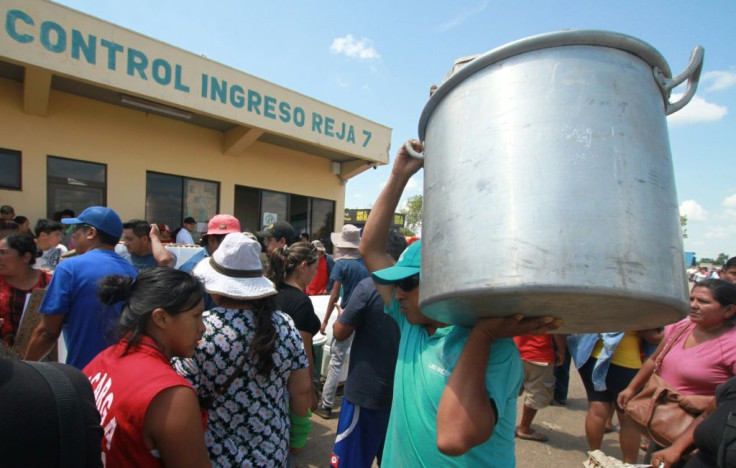Food Crunch: Bolivians Fly Aid To Relatives In Blockaded La Paz

Freddy's food aid package for relatives in the blockaded Bolivian city of La Paz weighs in at 90 pounds at the Santa Cruz airport -- slightly over the limit. He quickly removes a chicken from the polystyrene box and shouts "Ready!"
Freddy is among hundreds of people flocking to the airport's freight terminal in central Bolivia -- the Andean country's agriculture heartland -- every day to send food to hungry relatives in La Paz where chicken, beef and dairy products are getting harder to come by.
The city has been hit by severe food and fuel shortages for more than a week after supporters of ex-president Evo Morales set up road blocks along key transport routes in protest against caretaker President Jeanine Anez, who they want to resign.
Morales -- Bolivia's first indigenous president -- fled to Mexico after resigning on November 10 after violence erupted over last month's disputed elections.
At the airport in Bolivia's second largest city the queue to reach the freight dispatch office extends all the way outside to the sidewalk where the spring sunshine sends the temperature soaring to nearly 104 degrees Fahrenheit.
But neither the suffocating heat nor the long wait bother Ninoska Ramirez, whose luggage trolley is loaded with two polystyrene boxes filled with 11 pounds of meat.
She's hoping to get the packages on board one of the 15 daily commercial flights connecting Santa Cruz to La Paz.
"My relatives in La Paz tell me there is no meat and when there is, it's very expensive," Ramirez says.
"By rationing, I reckon this will last them for a week."
Freddy, who declined to give his surname, gasps at the rising cost of sending food packages to the city, an hour's flight from Santa Cruz.
"Now they're charging seven bolivianos (about a dollar) per kilo (2.2 pounds)," he tells AFP, estimating that the delivery will leave him 280 bolivianos out of pocket.
Felipe Loayza also prepares to ship a package to his relatives. "It's meat and vegetables, enough for three days," he tells AFP as planes line up on the tarmac.
Santa Cruz produces 70 percent of the food consumed in Bolivia, much of it transported to cities by road.
The blockade of a key fuel plant near La Paz also caused a gasoline shortage in the city and neighboring El Alto.
In an attempt to ease the food crunch, the interim government announced last week it would send several tons of chicken and other products to the city.
The Eastern Chamber of Agriculture, which covers Santa Cruz, promised to airlift between 270 and 300 tons of food per day. But shortages persist.
At least 32 people have been killed since the October 20 elections, including 17 in clashes with security forces as anti-government protesters block main roads.
The interim government hopes to strike a deal with protesters to "pacify the country" and lift the road blocks at a meeting later Saturday.
At the airport, Loayza has little to say about the political implications of the blockade. But he is optimistic the upheaval will end soon.
"I think the situation is starting to normalize" on the highways, he says.
© Copyright AFP 2024. All rights reserved.





















